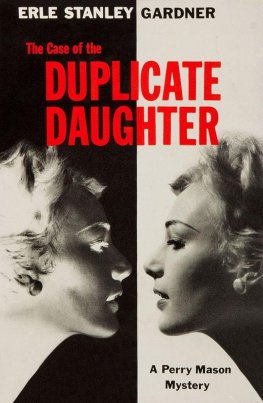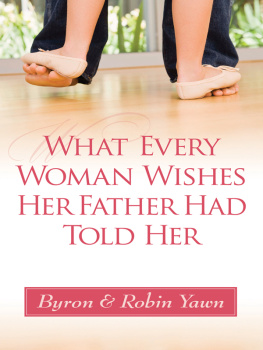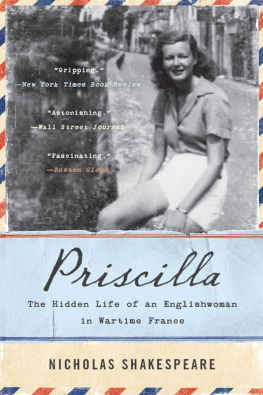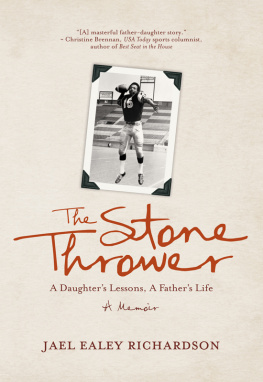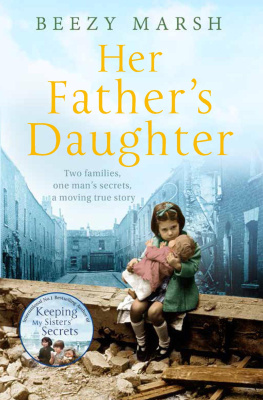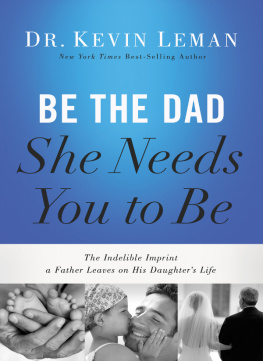The Critics Daughter
a memoir
Priscilla Gilman

IRINA: (Sobbing.) Where? Where has it all gone? Where is it? Oh my God, my God! I have forgotten everything, forgotten everything... Everything is confused in my head... I am forgetting everything, I forget more every day, and life flies past and never returns, never and we will never go to Moscow... I see now that we will never go...
Anton Chekhov, Three Sisters
That is what the highest criticism really is, the record of ones own soul.
Oscar Wilde, The Critic as Artist
Everything thats gone before, reaching back to the first moments, all the excitements and subsidings, the musings and expostulations, the innocent or calculated assertions, the flurries of encounter and withdrawal, the little enactments and disclosures of self, the tears and joys, the histories and prospectsall this flowers now into aesthetic logic; the end toward which these means have been moving is taking shape.
Richard Gilman,
Chekhovs Plays: An Opening into Eternity
forty characters in search of my father
(in order of appearance)
The King from Rodgers and Hammersteins The King and I
Rabbit Angstrom from John Updikes Rabbit, Run
Holden Caulfield from J. D. Salingers The Catcher in the Rye
Max Jamison from Wilfred Sheeds The Critic
Richard Gilman in John Updikes Bech: A Book
Daddy Warbucks from Annie, the musical
Big Bird from Sesame Street
The Nome King from L. Frank Baums Ozma of Oz
Uncle Wiggily from the Uncle Wiggily books
Huckle Cat and Lowly Worm from the Richard Scarry books
Mrs. Piggle-Wiggle from Betty MacDonalds
Mrs. Piggle-Wiggle series
Cookie Monster from Sesame Street
Kermit from Sesame Street
Grover from Sesame Street
Curious George and Paddington
Drosselmeyer from The Nutcracker
The critic from Rachel Cusks Kudos
Willy Wonka
The Captain in The Sound of Music
The Wizard from The Wizard of Oz
Johnny from Betty Smiths A Tree Grows in Brooklyn
Charlie Browns Christmas tree from A Charlie Brown Christmas
The Velveteen Rabbit and the child from
Margery Williamss The Velveteen Rabbit
Eddie Kerrigan from Jennifer Egans Manhattan Beach
Ted Kramer from Kramer vs. Kramer
Will Ladislaw from George Eliots Middlemarch
Mr. Darcy from Jane Austens Pride and Prejudice
Gene Kelly as Don Lockwood in Singin in the Rain and
Jerry Mulligan in An American in Paris
Tony from West Side Story
Kanji Watanabe from Akira Kurosawas Ikiru
Wilbur and Charlotte from E. B. Whites Charlottes Web
The Scarecrow from The Wizard of Oz
King Lear
Hamlet
Uncle Vanya
I lost my father for the first time when I was ten years old. In the months and years that followed, I lost him over and over, many times and in many different ways. This book is my attempt to find him.
The Critics Daughter
PROLOGUE
I m in a darkened Broadway theater at a revival of The King and I on a balmy evening in the summer of 2015. The production is sumptuous and beautifully sung, the show is stirring and delightful, and my spirits soar with the music. But then, the song Something Wonderful begins, and Im undone.
Sung by Lady Thiang, the Kings long-suffering Head Wife, to Anna Leonowens, the tutor brought from England to teach the Kings children, Something Wonderful is an impassioned plea to accept the King as he is and not desert him despite his many faults. With a simultaneous realism about his flaws and a deep belief in his virtues, Lady Thiang is trying to convince Annabothered by the Kings peevishness, put off by his egotism, and frightened of his volatilityto give him another chance. Her attempt to acknowledge his darkness but recognize his worth, to plead for mercy and forgiveness, ravages me. I am heaving with sobs. Tears wet the front of my silk summer dress and drip onto the program Im clutching. Willing myself to stifle the sobs, I let out an involuntary moan, and heads swivel. I drop my head into my lap, thinking of my father.
It hits me in that instant that the King has always represented my father to me. Peremptory but playful, immensely powerful but incredibly vulnerable, witty and smart but nave and quixotic. My father, in many ways the quintessential intellectual and a deeply cerebral man, was nonetheless a man who thought with his heart. He was an idealist. He was a romantic. He was fun and charming and charismatic, sweet and adorable and endearing. Like the King, he was hampered by pettiness and petulance. Like the King, he was both an autocrat and a radical. He wanted to do and be good, but his limitationshis rage, his defensiveness, his insecuritieshad hindered and hampered him at every turn. He was a man who stumbled and fell, but he was a man who tried.
Something Wonderful is sung again at the end of the show when the King has died. The death of that king, the strong man brought low, the powerful monarch reduced to a frail and mortal body, had always devastated me. Just like my father, he was a man on the brink of a breakthrough but was felled before he could achieve it. All of Lady Thiangs devotion couldnt save him. All of Annas influence couldnt save him. It was too late.
I saw myself in Lady Thiang, ardently pleading with Anna to see the King holistically, as more than just his temper and his weaker moments. All my life Id sung a version of Something Wonderful about my father to my mother. But unlike Lady Thiang with Anna, I had never managed to convince my mother to give my king a chance, acknowledge his virtues, see beyond his flaws. She hadnt relented. She still shuddered when she spoke of him. She still dismissed my missing him as obsessive. I needed my mother to acknowledge my fathers virtues. I needed her to see him in the round.
But I also saw myself as Anna. Frustrated and saddened and exhausted by a demanding and mercurial man, be he my father or romantic partners over the years. What had been the price of telling difficult and depressed men they were wonderful over and over again because they needed my love? Of protecting them when they were wrong? What was the cost of such protection? And how could I be both Annacritical, ethical, self-protectiveand Lady Thiangloyal, empathetic, loving?
On that night of overwhelming sadness in the theater, I realized that I had never been allowedand in some ways had never allowed myselfto truly grieve my father or reckon with his legacy to me. And now I knew I must.
I am haunted by my father. He has made me the thinker, writer, parent, human that I am, brought me to my knees, led me into dangerous romantic entanglements, buoyed me during times of crisis, informed my reading and writing and parenting in ways I am only now realizing. I am both drawn to and wary of places, people, works of art that will touch that sore spot in me, unleash that tide of sadness.
In college, I studied the literature of trauma. We read of how those who suffer trauma experience a bewildering discontinuity, an absolute break between before and after and spend their lives attempting to mediate that gap. We explored how the traumatized both yearn to be free of their pain, heal their wound, and resist forgetting, healing, getting over it.


